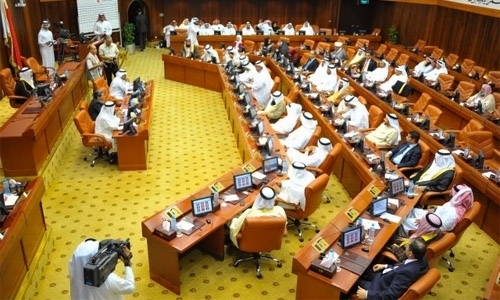House rejects proposal to ‘limit’ jurisdiction of MPs
Manama : The House of Representatives yesterday rejected a proposal that its members claimed will “cripple” their jurisdiction.
The proposal came up during the Council’s regular weekly session, which was chaired by the First Deputy Speaker Ali Al Aradi.
In the session, the majority of the MPs voted against a report issued by the Legislative and Legal Affairs Committee in support of a proposal to amend some of the Council’s internal regulations.
According to some of the opposing members, the proposal “denies MPs of their right to discuss the government’s replies to their proposals and limits their jurisdictions”.
The proposal was initially submitted by MPs Mohammed Milad, Abdulrahman Buali, Isa Turki, Mohammed Al Maarifi and Osama Al Khaja, with the aim of “saving MPs time and effort to discuss laws and legislations instead of the replies of the government to their proposals”.
They also said the “long time taken in discussing the government’s replies makes members feel bored and lazy to continue the session”.
According to the presenters, “discussing and commenting on the government’s replies to MPs’ proposals disrupts the work of the council and harms the interests of the state and citizens” considering it “a time-wasting procedure”.
MP Al Maarifi withdrew from the list of presenters of the proposal before the discussion began.
Depressing proposal
One of the main opposing voices to the proposal was Foreign Affairs, Defence and National Security Committee Chairman Abdulla Binhowail, who considered it as “a depressing proposal” to Bahraini citizens.
“This is a depressing proposal to Bahrainis. It further weakens our already weak council. Bahraini citizens now consider the House of Representatives as a powerless council. We have completed three years and we have few months remaining for this legislative term to end, and we failed to question at least one minister. Why restrict MPs of conveying the opinions of citizens,” Binhowail opined.
He continued lashing at the presenters of the proposal saying, “This is unfortunate as we represent the people of Bahrain and we took an oath to defend their rights. We couldn’t stand together to question a minister, why vote for a proposal that restricts us. After four years, what did this council really give to the people of Bahrain who are now depressed. Ministers are not even worried by the council as they know how helpless it is.”
Binhowail’s statements were unpalatable for some of the members, including the government’s representative in the session and Shura Council and Representative Council Affairs Minister Ghanim Al Buainain.
Minister Al Buainain was the first to reply saying, “Ministers treat this council with utmost respect and appreciation. The MP’s description of the council is rejected and unacceptable. The House of Representatives enjoys all jurisdictions that could be utilised by MPs whenever needed.”
MP Hamad Al Dossary was also provoked by Binhowail’s remarks. He said in his reply, “I reject what MP Binhowail said about the house being powerless. I have heard His Majesty the King multiple times saying that this is one of the best councils that worked and achieved. This council may have not questioned any ministers in the past three years, but it passed important legislations that are related to combating terrorism and other key matters.”
Binhowail responded to the comments of the minister and Al Dossary saying, “What I have said is reflecting what the Bahraini citizens are saying and feeling. They believe that the council is weak, not me. If we can’t criticise or express our opinions about the council, why are we here for.”
Several other MPs including Jalal Kadhim, Dr, Ali Bufarsen, Jamal Buhassan and Khalifa Al Ghanim expressed their rejection to the “crippling” proposal.
Buhassan called for adopting regulations similar to the ones followed in fellow GCC countries, referring to the Kuwaiti National Assembly, which grants each MP unlimited time to discuss and debate any matter.
Kadhim called upon his fellow MPs to “avoid wasting time” discussing the committee’s report and to either vote for or reject it.
Al Ghanim mocked the proposal saying, “If MPs aren’t allowed to speak out and discuss during their session, it would be better if they stayed home and not convene every week.”
Two of the presenters of the proposal, Mohammed Milad and Abdulrahman Buali, helplessly defended their proposal, claiming that “it would save MPs’ time and effort to discuss important legislations other than the government’s response to their proposals”.
Buali also added that the proposal would prevent repetition of the same discussions. Their statements didn’t change the opinion of the majority of MPs who were determined to reject the proposal.
Related Posts

